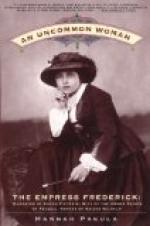“But not ourselves, I hope!” excitedly exclaimed Marianne. “This imperial power does not extend over our persons?”
Stephano roughly replied: “The door stands open, go! But go directly, or I shall be compelled to arrest you for opposing the execution of the laws, and stirring up sedition!”
“Yes, let us go,” cried Natalie, who had recovered her consciousness—“let us go, Marianne. Let us not remain a moment longer in a house belonging to that barbarous Russian empress who has condemned the noble Count Paulo as a criminal, and, robber-like, taken forcible possession of his property!”
And, following the first impulse of her noble pride, the young maiden took Marianne by the hand and drew her away.
“They, at least, shall not forcibly eject us,” said she; “no, no, we will go of our own free will, self-banished!”
“But where shall we go?” cried Marianne, wringing her hands.
“Where God wills!” solemnly responded the young maiden.
“And upon what shall we live?” wailed Marianne. “We are now totally destitute and helpless. How shall we live?”
“We will work!” said Natalie, firmly. A peculiar calm had come over her. Misfortune had awakened a new quality in her nature, sorrow had struck a new string in her being; she was no longer the delicate, gentle, suffering, unresisting child; she felt in herself a firm resolution, a bold courage, an almost joyful daring, and an invincible calmness.
“Work! You will work, princess?” whispered Marianne.
“I will learn it!” said she, and with a constantly quickened step they approached the outlet of the garden.
The gate which led out into the street was wide open; soldiers in Russian uniform had been stationed before it, keeping back with their carbines the curious Romans who crowded around in great numbers, glad of an opportunity to get a peep into the so-long-closed charmed garden.
“See, there she comes, the garden fairy!” cried they all, as Natalie neared the gate.
“How beautiful she is, how beautiful!” they loudly exclaimed.
“That is a real fairy, a divinity!”
Natalie heard none of these expressions of admiration—she had but one object, one thought. She wished to leave the garden; she wished to go forth; she had no regrets, no complaints, for this lost paradise; she only wished to get out of it, even if it was to go to her death.
But the soldiers stationed at the gate opposed her progress.
Natalie regarded them with terror and amazement.
“They cannot, at least, oppose my voluntary resignation of my property,” said she. “Away with these muskets and sabres! I would pass out!”
And the young maiden boldly advanced a step. But those weapons stretched before her like a wall, and Natalie was now overcome by anguish and despair; the inconsolable feeling of her total abandonment, of her miserable isolation. Tears burst from her eyes, her pride was broken, she was again the trembling young girl, no longer the heroic woman; she wept, and in tremulous tone, with folded hands, she implored of these rough soldiers a little mercy, a little compassion.




